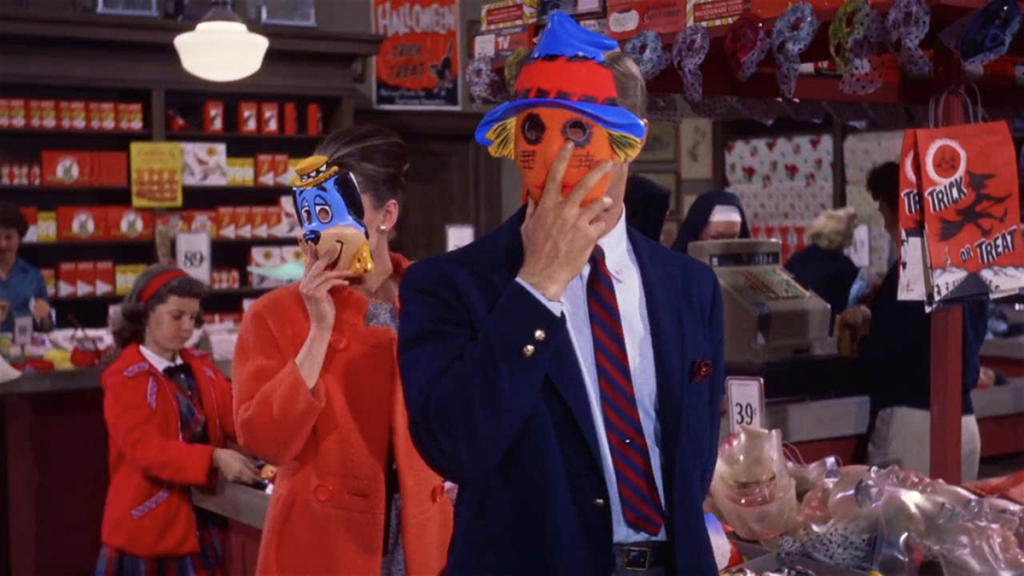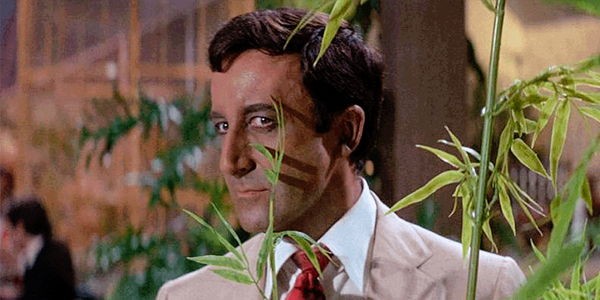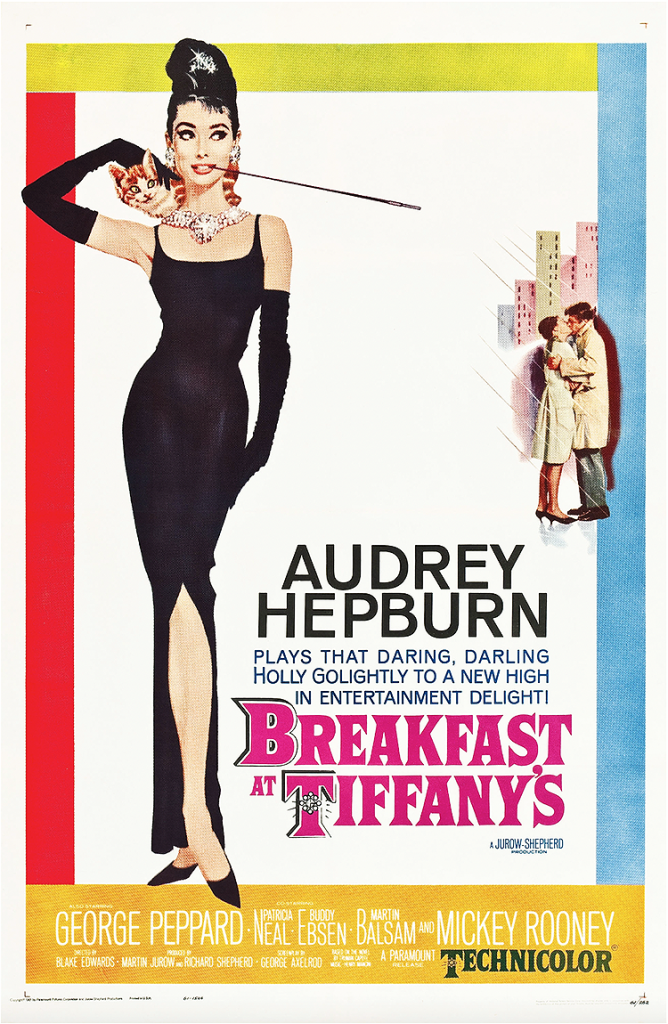related review
Miss Golightly, I Must Protest!
Some thoughts on Yunioshi
Because this film has been so viciously damned, and Blake Edwards was so relentlessly hounded, for Mickey Rooney’s portrayal of Mr. Yunioshi, and because those misperceptions still hang over Tiffany’s like a shroud, I would be remiss to review the film without weighing in.
Talking about the merits of Rooney’s performance is probably not the right way to tackle this, but I think partly what irks the political reeducation crowd is that Yunioshi actually is funny, even at this late date. Yes, there are a couple of moments that are a little too broad, but we are talking about Mickey Rooney after all.
The better tack, probably, is to talk about the glaring double standard that’s been applied to the film. Why hasn’t anybody gotten their dander up about Sally Tomato? Here’s a Jewish-American actor—Fred Flintstone, for chrissakes—playing an Italian in a stock-ethnic way just this side of Chico Marx. If one ethnic caricature is offensive, then they should all be. The seemingly endless number of warnings at the beginning of this innocuous film includes “yellowface.” It should say “goombah” as well. And yet Tomato raises nary a peep.
Following all this to its logical conclusion, Marlon Brando’s Vito Corleone—a mongrel Midwesterner playing an Italian mobster—ought to be damned as well. But—and maybe I’m just being short-sighted—I don’t ever see that day coming. If it does, we should all give up on the movies and play solitaire instead. But then someone would take issue with how the figures are portrayed on the playing cards.
If you want to get pissed off at anybody in Tiffany’s, it ought to be Paul Varjak. That was a creaky conception from the start that unintentionally exposed all the many biases of the time and ultimately created more problems than it solved. And George Peppard could never act his way out of a rain-soaked paper bag. That’s offensive.
—M.G.
Ignore all the culture-wars propaganda—this ultimate Audrey Hepburn vehicle still reigns as one of the great romantic comedies
by Michael Gaughn
July 17, 2022
There are so many things to be said about Breakfast at Tiffany’s—not in a nostalgia-dripping stroll-down-memory-lane kind of way but more in a “this thing still reverberates like crazy—why?” kind of way. And, like anything with potency in the present moment, those reverberations have an inevitable dark side.
But let’s tackle the upside first. It’s a little too obvious to begin with Audrey Hepburn, but how can you not? What she does with her character is still breathtaking, somehow managing to stay true to the depth and nuance of Truman Capote’s original conception of Holly while shepherding her through all the standard-issue Hollywood attempts to blandify her, emerging with a conception that somehow manages to synthesize and transcend both.
She owns this film, in a way very few other actors have ever owned a film. And, yes, I know that’s what everybody loves about Tiffany’s—but that tends to be because of all the charming, kooky stuff, not because Hepburn succeeded in investing Holly Golightly with a soul.
Usually, you’d give the director some credit for that, and Blake Edwards was brilliant in many ways, but no other female character in his work even comes close to being as fully developed or compelling. Golightly exists leagues beyond what he was able to accomplish elsewhere.
And keep in mind Edwards was still pretty much a yeoman when he made this film, with really only a couple of slapstick-driven service comedies (The Perfect Furlough and Operation Petticoat) under his belt. The sudden growth in his maturity as a filmmaker is more than obvious, and, as much as I love the original Pink Panther film and some of his other work, it’s a tremendous loss he never did another movie like this one—which suggests that Tiffany’s was one of those born-of-the zeitgeist miracles, like Casablanca, less the product of individual will and more the product of spontaneous generation.
Other things to praise: Like The Apartment, Tiffany’s manages to capture the spirit of New York at that early-‘60s moment when the city was at its peak, unknowingly perched on the edge of a precipice. And it does this despite—or maybe because of—having been made mostly on LA soundstages and only partly on location in NY. It remains a beautiful film to look at—much more beautiful than it deserved to be considering the production values of other similar productions from the time.
When I was a kid, one of the Toronto stations would broadcast movies after midnight that weren’t available on American TV. I would sneak downstairs after everyone else was asleep and gorge myself on fare I was probably too young to be watching. (In the case of Bloody Mama, definitely too young.) That’s how I first saw Tiffany’s, and it was the first time I remember being entranced by the look of a film. It was so much more vivid than anything else I’d ever seen that it seemed almost magical.
If I saw it again today presented that way, I’d probably be horrified. But there was something inherent in the quality—maybe best called “power”—of those images that wasn’t quashed by the limitations of the medium or the device. Tiffany’s, seen in 1080p on Prime, was faithful to that experience. I can’t say I was entranced—too much time has passed—but I was engaged and impressed. Can 4K improve on that? Possibly—but only if Paramount can resist inflicting the same “grain—bad; digital—good” revisionism that made a travesty of The Godfather.
The dialogue tracks are surprisingly clean—so clean you can easily make out whenever there’s a dubbed line. Originally mixed in mono, there’s nothing particularly good or bad about the stereo version here, except for a couple of jarring instances of hard panning. My biggest beef is that Henry Mancini’s score is presented in the Living Stereo style of his soundtrack albums, with that unrealistically wide soundstage making it feel like the music exists somewhere outside the film.
It’s hard to watch Tiffany’s and not get a little wistful about Mancini. His scores for this and The Pink Panther three years later are probably his best—evocative, ingenious, tasteful, never bombastic, setting the appropriate mood instead of telling you what to feel, polished expressions of the second American renaissance. But the British Invasion left him lost without a rudder and he could never recover his bearings long enough to ever summon up anything half as good as what he did so effortlessly in the early ‘60s.
The film’s biggest problem is structural, and might come from Edwards never having dealt with material this complex before. The whole thing starts to unravel around the 2/3s mark, which is when most movies start to come apart when the director doesn’t fully grasp his material. The problem is, Tiffany’s isn’t just a light and fluffy romantic comedy. Edwards and screenwriter George Axelrod had retained enough of Capote’s novella that its darker undercurrents start to deeply trouble everything at the point where the filmmakers have to start pulling all the threads together, causing the movie to go full-blown schizophrenic, oscillating wildly between dramatic scenes and silly vignettes that tend to rob the more serious moments of their power. This created an insoluble dilemma that led to the infamous “I own you” conclusion, with the now thoroughly unpleasant George Peppard asserting his blond-haired, blue-eyed straw-man’s rights over the beaten Golightly. All of that somehow doesn’t sink the film completely, but it’s a hell of a note to end on.
Miss Golightly, I Must Protest!
Some thoughts on Yunioshi
Because this film has been so viciously damned, and Blake Edwards was so relentlessly hounded, for Mickey Rooney’s portrayal of Mr. Yunioshi, and because those misperceptions still hang over Tiffany’s like a shroud, I would be remiss to review the film without weighing in.
Talking about the merits of Rooney’s performance is probably not the right way to tackle this, but I think partly what irks the political reeducation crowd is that Yunioshi actually is funny, even at this late date. Yes, there are a couple of moments that are a little too broad, but we are talking about Mickey Rooney after all.
The better tack, probably, is to talk about the glaring double standard that’s been applied to the film. Why hasn’t anybody gotten their dander up about Sally Tomato? Here’s a Jewish-American actor—Fred Flintstone, for chrissakes—playing an Italian in a stock-ethnic way just this side of Chico Marx. If one ethnic caricature is offensive, then they should all be. The seemingly endless number of warnings at the beginning of this innocuous film includes “yellowface.” It should say “goombah” as well. And yet Tomato raises nary a peep.
Following all this to its logical conclusion, Marlon Brando’s Vito Corleone—a mongrel Midwesterner playing an Italian mobster—ought to be damned as well. But—and maybe I’m just being short-sighted—I don’t ever see that day coming. If it does, we should all give up on the movies and play solitaire instead. But then someone would take issue with how the figures are portrayed on the playing cards.
If you want to get pissed off at anybody in Tiffany’s, it ought to be Paul Varjak. That was a creaky conception from the start that unintentionally exposed all the many biases of the time and ultimately created more problems than it solved. And George Peppard could never act his way out of a rain-soaked paper bag. That’s offensive.
—M.G.
Michael Gaughn—The Absolute Sound, The Perfect Vision, Wideband, Stereo Review, Sound & Vision, The Rayva Roundtable, marketing, product design, some theater designs, a couple TV shows, some commercials, and now this.
PICTURE | Tiffany’s, seen in 1080p on Amazon Prime, is amazingly faithful to one of the most beautifully shot Technicolor films ever
SOUND | The dialogue tracks are so clean you can easily hear when there’s a line dub, but the stereo mix of Mancini’s score fails to integrate it with the rest of the film
© 2023 Cineluxe LLC




